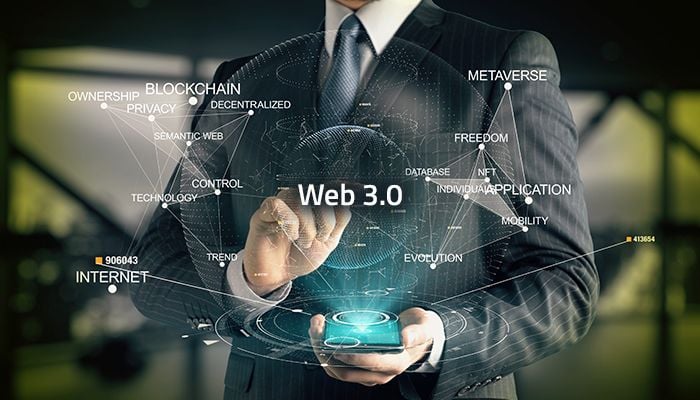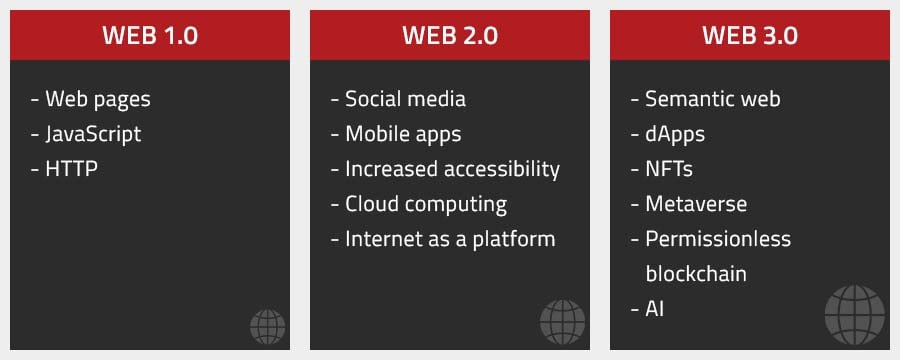Digital Transformation | 22 Apr 2022 | 12 min
The World of Web 3.0

Call me paranoid, but I guess I used to sometimes shrivel at the thought of how the world wide web has advanced and how AI was fast becoming a part of our lives, a sneeze next to my phone has one of my apps notifying me about discounts when I buy my meds next time, or a supremely animated talk with friends or family about wanting to go to a dream destination has another app throw an ad for a never-before-offer to the very same place when I open it a few days later.
But that is exactly where we are heading to, a semantic world where machines learn to read human data accurately and respond to it instantly. And that is what Web 3.0 is all about!

Long, long ago we sifted through reams of books to learn what was there to be learnt, then a far-sighted individual said, I would rather knowledge comes to me than I seek it – that is when Web 1.0 was born. HTTP protocols, HTML pages, and invention of languages that machines could understand like JavaScript, and not to forget the screeching sound when you decided to connect with the web – from the smell of books to the smell of wires if I might say. Simple interaction with servers and search engines was where it all began.
Then came the second phase – why should I sit in one place to know everything; I would rather it serves me on the go – accessibility was the mother of Web 2.0. Everything was real-time, highly collaborative, and far more interactive. Where Web 1.0 told me what I was reading, Web 2.0 told me who else was reading that with me. Web 2.0 included what was a generation of smartphones and cloud computing, an age of big data, and social networks; it was an era where digital communication was champion, and the internet was a platform for all things important.
Once we sold our souls on e-commerce sites and shared all our data with social media giants, we saw the perils of having all our data stored centrally and we wished we could go to the world that Tim Berners-Lee showed us when he introduced us to the World Wide Web, a world where the internet was decentralized, where everyone could participate equally, where there was no controlling node.
This was put into the back burner for a while since Tim’s ask was for a semantic web where the interaction between human and software was ‘intelligent;’ a smarter internet that allowed maintaining security of a user’s personal data; a decentralized permissionless web.
Tim’s semantic web did not see fruition, but we still can achieve Web 3.0 thanks to technologies like distributed ledgers and blockchain, data and apps can now be decentralized (dApps). This means websites and mobile applications created with Web 3.0 in mind will become far more immersive, easy to use, highly secure, provide access to more beneficial information, and will offer privacy to users like never before.
With no centralized body to govern and political censorship out of scope, a Web 3 social media platform will give way to more user generated content, where so far social media platforms have seen value without a lot of rewards in sight; a social app with a revenue model using blockchain and NFTs will help increase not only content creation but also ensure that people could earn cryptocurrency through it, ultimately enhancing digital experiences and benefitting both the creator – who can sell and the user – who is rewarded for the social interaction.
What I think the biggest benefit is probably that privacy is protected in the mix where users can choose what they want to share and when.
A semantic web calls for increased and intelligent use of search engines to be able to accurately produce results often in a tailored manner using various algorithms even faster and securely than web 2.0. Using Artificial Intelligence in Web 3.0 means users will get exactly what they want, that is things that are relevant to them devoid of all the fluff. Chatbots and automation will reach new heights. With better user experience of product and customer support via Chatbots and AI/ML, query resolution will be a breeze.
Imagine making it super advanced with Machine learning partaking in the blockchain universe where you can aim for intelligent logic, predicting transactions, and having smarter contracts, and protocols in place. The possibilities thus with Web 3.0 and what it means for Artificial Intelligence and Machine learning as technologies are immense.
With Big Data, things get a whole lot bigger. From 3Vs (volume, velocity, and variety) we move to 7Vs (volume, velocity, variety, value, veracity, variability, and visualization) for Web 3.0. I will talk about the 7Vs another day.
With Web 3.0, the idea of decentralizing storage seems a great fit for the new privacy loving world.
Web 3.0 decentralized storage solutions often mean that data is protected through a strong encryption and no centralized entity exists, so data is accessible only to a privileged few.
The metaverse is another episode that was added to this whole Web 3.0 series recently, this spells virtual reality, 3D, and 4D in a whole new way. Here although your data is stored centrally, each person is connected in a decentral way. This is pretty much a world stuffed with brands that you can shop for but in the most secure manner possible. My colleague has penned a nice blog about the Metaverse, do give it a read.
So, if we know that 1999 marked the start of Web 1.0 and roughly the dot-com bubble (2006) marked the beginning of Web 2.0, what is the timeline like for Web 3.0 and what comes after that?
Well, these are questions only time can tell, what I can say is when you have the power to sell your data and get paid for it, when you can browse the internet so privately that you can search for cat food only when you want, and suddenly you get only relevant information and none of the extra balderdash around you – the day has come!
Do send an email if you would like to share your views about the blog that you just read or the topic we discussed. You could also visit our website to know more about who we are and what we do, and here is also a link to our resource hub, so you can explore all that we have accomplished so far in the software world.

we'll keep you in the loop with everything that's trending in the tech world.
